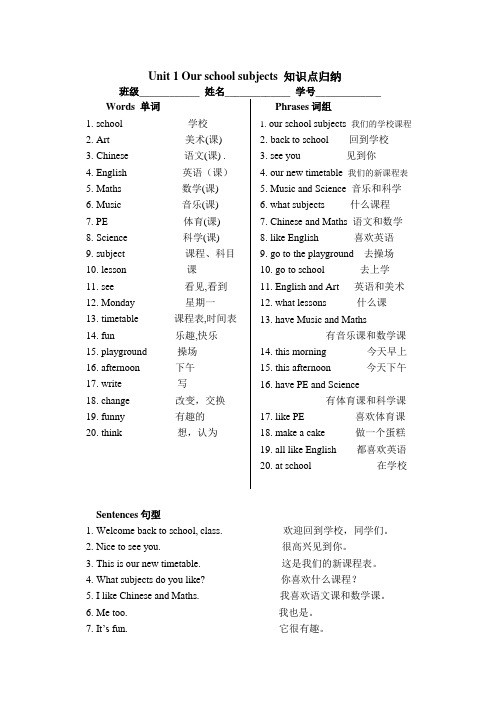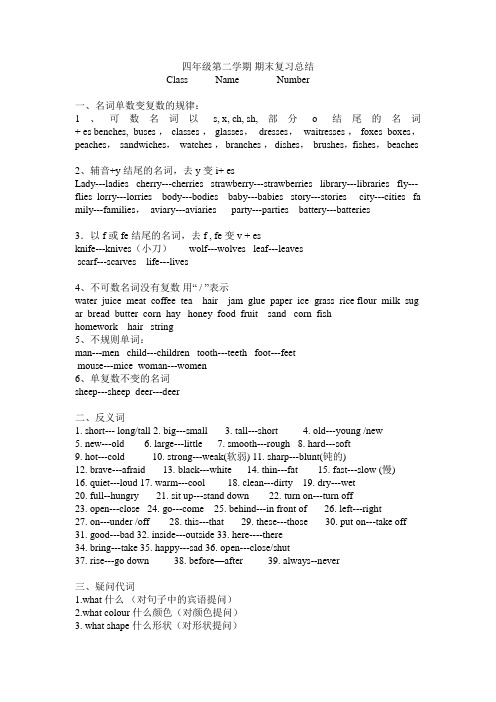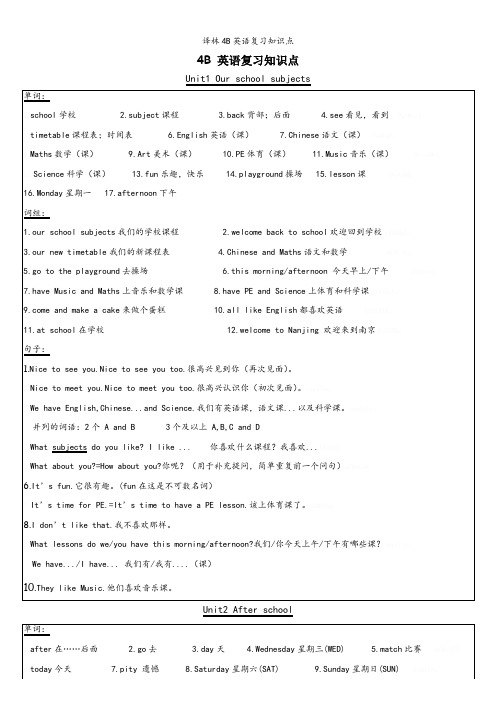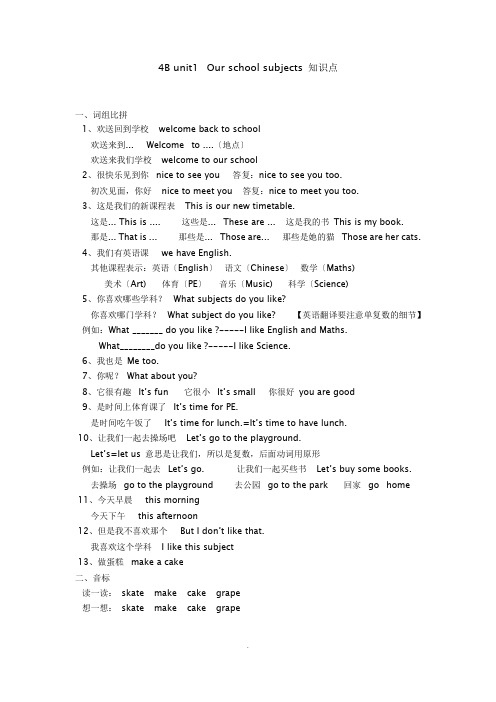新译林_4B_期末全册知识点总结
[译林版]4B Unit13-Unit14知识点整理
![[译林版]4B Unit13-Unit14知识点整理](https://img.taocdn.com/s3/m/2f6eeac8f80f76c66137ee06eff9aef8941e48a7.png)
[译林版]4B Unit13-Unit14知识点整理译林版4B Unit13-Unit14知识点整理Unit131. Vocabulary- assistant (n. 助手): a person who helps or aids another person.assistant (n. 助手): a person who helps or aids another person.- creative (adj. 有创造力的): having the ability to create or invent something.creative (adj. 有创造力的): having the ability to create or invent something.- helpful (adj. 有帮助的): providing assistance or support.helpful (adj. 有帮助的): providing assistance or support.- independently (adv. 独立地): without relying on others or outside help.independently (adv. 独立地): without relying on others or outside help.- strategy (n. 战略): a plan or method for achieving a goal.strategy (n. 战略): a plan or method for achieving a goal.- confirmed (adj. 已确认的): verified or proven to betrue.confirmed (adj. 已确认的): verified or proven to be true.- decisions (n. 决策): choices or conclusions reached after careful consideration.decisions (n. 决策): choices or conclusions reached after careful consideration.2. SummaryUnit141. Vocabulary- documents (n. 文档): written or printed materials that contain information or evidence.documents (n. 文档): written or printed materials that contain information or evidence.- goals (n. 目标): the objectives or targets to be achieved.goals (n. 目标): the objectives or targets to be achieved.- format (n. 格式): the arrangement or structure of a document or piece of writing.format (n. 格式): the arrangement or structure of a document or piece of writing.- concise (adj. 简明扼要的): expressing ideas or information in a clear and succinct manner.concise (adj. 简明扼要的): expressing ideas or information in a clear and succinct manner.2. Summary以上为译林版4B Unit13-Unit14知识点整理。
译林版小学英语小学四年级下册(4B)全册考点知识点归纳

Unit 1 Our school subjects 知识点归纳班级____________ 姓名_____________ 学号_____________Words 单词1. school 学校2. Art 美术(课)3. Chinese 语文(课) .4. English 英语(课)5. Maths 数学(课)6. Music 音乐(课)7. PE 体育(课)8. Science 科学(课)9. subject 课程、科目10. lesson 课11. see 看见,看到12. Monday 星期一13. timetable 课程表,时间表14. fun 乐趣,快乐15. playground 操场16. afternoon 下午17. write 写18. change 改变,交换19. funny 有趣的20. think 想,认为Phrases词组1.our school subjects 我们的学校课程2.back to school 回到学校3. see you 见到你4. our new timetable 我们的新课程表5. Music and Science 音乐和科学6. what subjects 什么课程7. Chinese and Maths 语文和数学8. like English 喜欢英语9. go to the playground 去操场10. go to school 去上学11. English and Art 英语和美术12. what lessons 什么课13. have Music and Maths有音乐课和数学课14. this morning 今天早上15. this afternoon 今天下午16. have PE and Science有体育课和科学课17. like PE 喜欢体育课18. make a cake 做一个蛋糕19. all like English 都喜欢英语20. at school 在学校Sentences句型1. Welcome back to school, class. 欢迎回到学校,同学们。
新译林版英语4b期末复习总结

四年级第二学期期末复习总结Class ____ Name ______ Number____一、名词单数变复数的规律:1、可数名词以s, x, ch, sh,部分o结尾的名词+ es benches, buses , classes , glasses, dresses, waitresses , foxes boxes,peaches, sandwiches, watches , branches , dishes, brushes,fishes, beaches2、辅音+y结尾的名词,去y变i+ esLady---ladies cherry---cherries strawberry---strawberries library---libraries fly---flies lorry---lorries body---bodies baby---babies story---stories city---cities fa mily---families, aviary---aviaries party---parties battery---batteries3.以f或fe结尾的名词,去f , fe 变v + esknife---knives(小刀) wolf---wolves leaf---leavesscarf---scarves life---lives4、不可数名词没有复数用“ / ”表示water juice meat coffee tea hair jam glue paper ice grass rice flour milk sug ar bread butter corn hay honey food fruit sand corn fishhomework hair string5、不规则单词:man---men child---children tooth---teeth foot---feetmouse---mice woman---women6、单复数不变的名词sheep---sheep deer---deer二、反义词1. short--- long/tall2. big---small3. tall---short4. old---young /new5. new---old6. large---little7. smooth---rough8. hard---soft9. hot---cold 10. strong---weak(软弱) 11. sharp---blunt(钝的)12. brave---afraid 13. black---white 14. thin---fat 15. fast---slow (慢) 16. quiet---loud 17. warm---cool 18. clean---dirty 19. dry---wet20. full--hungry 21. sit up---stand down 22. turn on---turn off23. open---close 24. go---come 25. behind---in front of 26. left---right27. on---under /off 28. this---that 29. these---those 30. put on---take off 31. good---bad 32. inside---outside 33. here----there34. bring---take 35. happy---sad 36. open---close/shut37. rise---go down 38. before—after 39. always--never三、疑问代词1.what什么(对句子中的宾语提问)2.what colour 什么颜色(对颜色提问)3. what shape什么形状(对形状提问)4.what time什么时间(对几点钟提问)5.where哪里(对地点/介词词组提问)6.when什么时候(对时间/年,月,日,星期提问7.which哪一个/哪一些(对句子中的定语提问)8.why为什么(对原因提问)9.who谁(对主语,宾语提问)10.whose谁的(对所有格提问)11..how怎样(对方式,程度,身体提问)12. how many多少(对可数名词数量提问)13. how old几岁(对年龄提问)14..how much多少(对不可数名词数量提问,对价格提问)四、人称代词主格宾格所有格 I me my you you your he him his she her her it it its we us our you you your they t hem their五、同音词here---hear where---wear their---there meet---meat for---four too---two---to I---eye know---no see---sea pear---pair dear---deer bee---be son---sun hour---our bye---by---buy write---right flower--flourknow---no who’s---whose六、时态1、一般现在时1)表达频繁发生,反复发生,习惯性发生的一种状态。
译林4B英语复习知识点

3.What a pity! 真遗憾!
4.What about Saturday?星期六怎么样?
5.We don’t haveany lessonson Saturday. 我们星期六没有任何课。
e and play table tennis 来打乒乓球 4.have a football match进行一场足球比赛TT5IB31。
5.have a swimming lesson有一节游泳课6.on Saturday在星期六vdo0Ia1。
7.have Chinese and Maths上语文和数学课8.every day每天9AzoVVt。
12.Science科学(课) 13.fun乐趣,快乐 14.playground操场 15.lesson课zRyKA8Q。
16.Monday星期一 17.afternoon下午
词组:
1.our school subjects我们的学校课程 2.welcome back to school欢迎回到学校jYGkBp5。
9.get up起床10.get up at six在六点起床DvA1Lcp。
11.ina week在一星期*12. the days of the week一周的日子*BEDM0Rd。
句子:(带*的表示知道意思,能看懂即可,有余力的可以写一写)
今天星期几?今天星期...
e and make a cake来做个蛋糕10.all like English都喜欢英语E5dt9XO。
11.at school在学校12.welcome to Nanjing 欢迎来到南京Qt9ZBBx。
新译林-4B-总复习

4B unit1 Our school subjects 知识点一、词组比拼1、欢送回到学校welcome back to school欢送来到... Welcome to ....〔地点〕欢送来我们学校welcome to our school2、很快乐见到你nice to see you 答复:nice to see you too.初次见面,你好nice to meet you 答复:nice to meet you too.3、这是我们的新课程表This is our new timetable.这是... This is .... 这些是... These are ... 这是我的书This is my book.那是... That is ... 那些是... Those are... 那些是她的猫Those are her cats.4、我们有英语课we have English.其他课程表示:英语〔English〕语文〔Chinese〕数学〔Maths) 美术〔Art) 体育〔PE〕音乐〔Music) 科学〔Science)5、你喜欢哪些学科?What subjects do you like?你喜欢哪门学科?What subject do you like? 【英语翻译要注意单复数的细节】例如:What _______ do you like ?-----I like English and Maths.What________do you like ?-----I like Science.6、我也是Me too.7、你呢?What about you?8、它很有趣It’s fun它很小It’s small你很好you are good9、是时间上体育课了It’s time for PE.是时间吃午饭了It’s time for lunch.=It’s time to have lu nch.10、让我们一起去操场吧Let’s go to the playground.Let’s=let us 意思是让我们,所以是复数,后面动词用原形例如:让我们一起去Let’s go.让我们一起买些书Let’s buy some books.去操场go to the playground 去公园go to the park 回家go home 11、今天早晨this morning今天下午this afternoon12、但是我不喜欢那个But I don’t like that.我喜欢这个学科I like this subject13、做蛋糕make a cake二、音标读一读:skate make cake grape想一想:skate make cake grape译林4B unit2 After school 知识点一、复习比拼1、一周的七天Sunday Monday Tuesday Wednesday Thursday Friday Saturday(一周的第一天是Sunday)2、让我们一起去打乒乓球吧Let’s go and play table tennis.让我们一起去公园吧\回家吧Let’s go to park\Let’s go home.3、今天星期几?今天是星期三What day is it today?---It’s Wednesday.今天几号?What is the date today?4、我有一场足球赛I have a football match.5、来打乒乓球Come and play table tennis.去吃苹果Go and eat an apple.6、我有游泳课I have a swimming lesson.他也有游泳课He has a swimming lesson too.7、...怎么样?What about ...8、真遗憾what a pity.9、在周六on Saturday 〔在具体星期几前面用on〕她有一节课She has a lesson.周六我们没有课We don’t have any lessons on Saturday .10、好的、没问题All right.11、玩一个游戏Play a game.12、早上好Good morning.下午好Good afternoon晚上好Good evening晚安Good night.13、你每天什么时候起床?When do you get up every day?他每天什么时候起床?When does he get up every day?每一个every 每天every day 每个苹果every apple 每个男孩every boy 她每天什么时候去上学?When does she go to school every day?14、在六点at six (时间前面用介词at)15、我5点起床I get up at five.我爸爸7点起床My father gets up at seven.16、你今天有什么课?What lessons do you have today?17、猫在哪儿?Where is the cat?二、音标读一读:bag cap hamburger sandwich snack dad cat想一想:bag cap hamburger sandwich snack dad cat4B unit3 My day 知识点一、知识点复习1、我的一天My day2、谈谈关于... Talk about(介词〕... 谈谈我talk about me 谈谈他:3、在七点at seven 在上午in the morning 在周一on Monday 在7:30:4、你什么时候做什么?When do you...?例如:你什么时候起床?When do you get up?你什么时候去上学?When do you go to school?你什么时候吃午饭?When do you have lunch?答复:我七点起床我通常7:40去学校我12:00吃午饭5、我上午有四节课I have four lessons in the morning.汤姆下午有一节课:我今天有一节体育课I have one PE lesson today.他们昨天有两节英语课:6、踢足球play football 打篮球play basketball7、做作业do homework 做家务do housework我做我的作业I do my homework. 他做他的作业:8、吃晚饭have dinner 吃早饭:吃午饭:9、看电视watch TV 看电影see a film 看书read a book10、上床睡觉go to bed11、在晚上in the evening 在夜里at night 晚安Good night!12、现在几点了?What time is it now? 答复:现在七点It’s seven.今天几号?今天星期几?13、在那边over there14、可以看见一个蛋糕can see a cake我可以看见一个蛋糕I can see a cake. 他可以看见两只老虎:15、多大的蛋糕啊!What a big cake!16、我喜欢蛋糕I like cakes.17、我们是谁?Who are we? 你是谁?Who are you? 她是谁?Who is she?18、遇见李老师meet Miss Li 遇见萨姆:二、音标1、读一读:me she green sleep three2、想一想:me she green sleep threeUnit3 My day知识要点班级___________ 姓名___________一、语音e/ee [i:] me she green sleep three he meet weWho are we? Tom, Jack and me. We meet Miss Li at three.二、词组:1、have lunch 吃饭2、play football 踢足球3、have dinner 吃晚饭 4、go to bed 去睡觉 5、at night 在夜里 6、have breakfast 吃早饭 7、over there 在那边 8、like cakes 喜欢蛋糕9、this cake 这块蛋糕 10、a nice cake 一块美味的蛋糕 11、get up 起床 12、seven o’clock 7点钟 13、usually 通常 14、go to school 去上学 15、at seven forty 在7:40 16、four lessons 四节课 17、in the morning 在上午 18、in the afternoon 在下午 19、at twelve 在12:00 20、go home 回家 21、do my homework 做家作 22、at five thirty 在5:30 23、watch TV 看电视 24、at six fifteen 在6:15 25、every day 每天 26、in the evening 在晚上 27、every Sunday 每周日 28、have lessons 上课29、my day 我的一天 30、When= What time 什么时候三、句型:1、When do you get up? 你什么时候起床? I get up at seven. 我7:00起床。
【译林版】4B期末知识点总复习

4B期末知识点总复习4B字母单词辨音归纳:a /ei / c a ke、gr a pe、m a ke、sk a te、K a te、n a me、t a ble、timet a ble、sn a ke、s a fe、t a ke、pl a y、pl a yground、l a kea /æ /b a g、c a p、h a mburger、s a ndwich、sn a ck、D a d、c a t、m a tch、S a turday、M a ths、b a ck、a pple、h a ppy、s a d、bl a ck、j a cket、h a ve、h a s、c a n、b a d、S a m、h a nde, ee / i: / m e、sh e、h e、gr ee n、sl ee p、thr ee、tr ee、s ee、coff ee、w ee k、e vening、f e ver、j e ans、sp e ak、cr e ame / e / b e d、d e sk、p e n、r e d、t e n、K e n、e gg、l e t、wh e n、W e dnesday、l e sson、g e t、e very、p e ncil、B e n、v e ry、w e lcome、w e ll、h e adache、dr e ss、sw e ateri /ai / Ch i nese、Sc i ence、Fr i day、k i te、l i ke、t i me、wh i te、M i ke、f i ve、f i ne、n i ght、r i ght、i ce、b i ke、r i de、n i ce、n i ne、t i ger、l i fe、cl i mb、i deai /i / Engl i sh、f i sh、h i m、mus i c、p i g、l i sten、tenn i s、d i nner、even i ng、draw i ng、r i ver、d i fficult、h i ll、p i ll、i ll、spr i ng、sw i m、sw i mming、p i cnic、w i nter、s i x、th i nk、thin、f i fty、b i g、hiso / əu / cl o se、g o、h o me、n o、n o se、o pen、J o e、R o se、c o ld、o ld、s o、o ver、h o mework、b o at、b o ating、sn o w 、sn o wman、c o at、mang oo /ɔ/ c o ffee 、h o t、d o g、n o t、s o ck、b o x、f o x、sh o rt、sh o rts、d o ctor、m o rning、f o rty、l o t、o range、B o bby、s o rry、o’cl o ck、d oo r、c o ugh易错知识点:1. 介词at, in, on的用法at表示在“某时刻或某个时间点”,如at one o’clock at three fifteenin表示在“某段时间内”如在早晨in the morning 在下午in the afternoon 在晚上in the evening,但是在夜里at night 一年四季用介词in 如:in spring, in summeron表示“具体某一天、某天上午、下午或者晚上”如on Sunday, on my birthday, on Monday evening2. 主语为第三人称单数,动词have变has, 或在动词后加s, 如:第三人称单数是指例如:he, she, it, the boy, 单个的人名(1)She/He/David has a fever/has lunch.(2)She/He/David draws some pictures in the park.(3)He gets up at seven.3. 在can, can’t, want to, don’t, let’s后面加动词原形。
[译林版]4B U1-U4知识点精华提炼
![[译林版]4B U1-U4知识点精华提炼](https://img.taocdn.com/s3/m/0f70e7d3aff8941ea76e58fafab069dc502247f1.png)
4B Unit1 知识点1.what subjects 和what lessons 的区别及考点what 后面的学科和课要加s; 即what subjects 和what lessons; what subjects 讲的是科目、学科,subjects 一般和like 连用; 如:What subjects do youlike? 你喜欢什么学科?特殊情况:若强调本学期有什么科目,subjects 可与have 连用;如:What subjects do you have this term(学期)?这学期你有什么科目啊?what lessons 讲的是每天要上的课,lessons 一般和have 连用; 如:What lessons do you have? 你有什么课?2.学科类名词首字母要大写; 如:Science;Chinese;Art;English;Maths;Music;PE 等3.评价某个学科有趣用It's fun; It's cool.4.今天早上用this morning; 在早上用in the morning;5.操场前面要加the; 如go to the playground 去操场6.多个学科并列时要用逗号隔开(不能用顿号),最后两个单词之间要用and 连接;否定句中and 改成or1.星期考点4B Unit2 知识点①星期一到星期天分别是(拼写):星期天Sunday;星期一Monday;星期二Tuesday;星期三Wednesday;星期四Thursday;星期五Friday;星期六Saturday;②英语中,一个星期的第一天是星期天;如考题: Sunday is the first(第一) day of a week(一周).③在星期几前面的介词用on; 即on + 星期几;在星期几的上午或下午直接在星期后加morning 或afternoon;如:on Sunday morning 在星期天上午④对星期几提问特殊疑问词用What day; 回答星期几用It's + 星期几;2.It's time for / to 考点(是时候做...)It’s time for 后接名词如:It's time for school. school 为名词It's time to 后接动词词组如:It’s time to go to school. go to school 为动词词组3.some、any 考点①some 在部分疑问句和否定句中要改为any②用于征求对方意见并且希望得到肯定答复的时候,some 无须改为any;总结为以下3 种情况(1) Would you like some ... ? (2)What/How about some ... ? (3)Can I have some ...?4.like 考点①like 后接可数名词要用复数形式; 如:like mangoes②like 后接动词时要用动词ing 形式; 如:like playing basketball△Who are we? 我们是谁?△We meet Miss Li at three. 我们在三点见到李老师。
[译林版]4B U1-U8知识要点总结(精简版)
![[译林版]4B U1-U8知识要点总结(精简版)](https://img.taocdn.com/s3/m/3fa5e39c0129bd64783e0912a216147917117ee4.png)
[译林版]4B U1-U8知识要点总结(精简版)本文档总结了[译林版]4B课本Unit 1到Unit 8的重点知识。
Unit 1: Our Hobbies- 研究了谈论兴趣爱好的表达方式,如“I like...”,“I don’t like...”等。
Unit 2: Meet My Family- 研究了介绍家庭成员的表达方式,如“Myfather/mother/brother/sister...”等。
Unit 3: How Do You Go to School?- 研究了交通工具的表达方式,如“by bus”,“by bike”等。
Unit 4: What's the Weather Like Today?- 研究了描述天气情况的表达方式,如“It's sunny”,“It's rainy”等。
Unit 5: What Would You Like for Breakfast?- 研究了点餐和描述食物的表达方式,如“I'd like...”,“It's delicious”等。
Unit 6: Where Are My Pencils?- 研究了描述物品位置的表达方式,如“on/in/under/behind...”等。
Unit 7: I Can Swim- 研究了谈论自己的能力的表达方式,如“I can swim”,“I can dance”等。
Unit 8: My Neighborhood- 研究了描述周围环境的表达方式,如“There is/are...”,“near/far from...”等。
以上是[译林版]4B课本Unit 1到Unit 8的重点知识总结。
总结内容简洁,概括了每个单元的核心内容,对学生复有很大帮助。
本文档是根据教材内容总结的,所有内容均为根据教材所做的概括,请确保与教材内容一致。
- 1、下载文档前请自行甄别文档内容的完整性,平台不提供额外的编辑、内容补充、找答案等附加服务。
- 2、"仅部分预览"的文档,不可在线预览部分如存在完整性等问题,可反馈申请退款(可完整预览的文档不适用该条件!)。
- 3、如文档侵犯您的权益,请联系客服反馈,我们会尽快为您处理(人工客服工作时间:9:00-18:30)。
4B unit1 Our school subjects 知识点一、词组比拼1、欢迎回到学校welcome back to school欢迎来到... Welcome to ....(地点)欢迎来我们学校welcome to our school2、很高兴见到你nice to see you 回答:nice to see you too.初次见面,你好nice to meet you 回答:nice to meet you too.3、这是我们的新课程表This is our new timetable.这是... This is .... 这些是... These are ... 这是我的书This is my book.那是... That is ... 那些是... Those are... 那些是她的猫Those are her cats.4、我们有英语课we have English.其他课程表示:英语(English)语文(Chinese)数学(Maths) 美术(Art) 体育(PE)音乐(Music) 科学(Science)5、你喜欢哪些学科?What subjects do you like?你喜欢哪门学科?What subject do you like? 【英语翻译要注意单复数的细节】例如:What _______ do you like ?-----I like English and Maths.What________do you like ?-----I like Science.6、我也是Me too.7、你呢?What about you?8、它很有趣It’s fun它很小It’s small你很好you are good9、是时间上体育课了It’s time for PE.是时间吃午饭了It’s time for lunch.=It’s time to have lunch.10、让我们一起去操场吧Let’s go to the playground.Let’s=let us 意思是让我们,所以是复数,后面动词用原形例如:让我们一起去Let’s go.让我们一起买些书Let’s buy some books.去操场go to the playground 去公园go to the park 回家go home11、今天早晨this morning今天下午this afternoon12、但是我不喜欢那个But I don’t like that.我喜欢这个学科I like this subject13、做蛋糕make a cake二、音标读一读:skate make cake grape想一想:skate make cake grape译林4B unit2 After school 知识点一、复习比拼1、一周的七天Sunday Monday Tuesday Wednesday Thursday Friday Saturday (一周的第一天是Sunday)2、让我们一起去打乒乓球吧Let’s go and play table tennis.让我们一起去公园吧\回家吧Let’s go to park\Let’s go home.3、今天星期几?今天是星期三What day is it today?---It’s Wednesday.今天几号?What is the date today?4、我有一场足球赛I have a football match.5、来打乒乓球Come and play table tennis.去吃苹果Go and eat an apple.6、我有游泳课I have a swimming lesson.他也有游泳课He has a swimming lesson too.7、...怎么样?What about ...8、真遗憾what a pity.9、在周六on Saturday (在具体星期几前面用on)她有一节课She has a lesson.周六我们没有课We don’t have any lessons on Saturday .10、好的、没问题All right.11、玩一个游戏Play a game.12、早上好Good morning.下午好Good afternoon晚上好Good evening晚安Good night.13、你每天什么时候起床?When do you get up every day?他每天什么时候起床?When does he get up every day?每一个every 每天every day 每个苹果every apple 每个男孩every boy 她每天什么时候去上学?When does she go to school every day?14、在六点at six (时间前面用介词at)15、我5点起床I get up at five.我爸爸7点起床My father gets up at seven.16、你今天有什么课?What lessons do you have today?17、猫在哪儿?Where is the cat?二、音标读一读:bag cap hamburger sandwich snack dad cat想一想:bag cap hamburger sandwich snack dad cat4B unit3 My day 知识点一、知识点复习1、我的一天My day2、谈谈关于... Talk about(介词)... 谈谈我talk about me 谈谈他:3、在七点at seven 在上午in the morning 在周一on Monday 在7:30:4、你什么时候做什么?When do you...?例如:你什么时候起床?When do you get up?你什么时候去上学?When do you go to school?你什么时候吃午饭?When do you have lunch?回答:我七点起床我通常7:40去学校我12:00吃午饭5、我上午有四节课I have four lessons in the morning.汤姆下午有一节课:我今天有一节体育课I have one PE lesson today.他们昨天有两节英语课:6、踢足球play football 打篮球play basketball7、做作业do homework 做家务do housework我做我的作业I do my homework. 他做他的作业:8、吃晚饭have dinner 吃早饭:吃午饭:9、看电视watch TV 看电影see a film 看书read a book10、上床睡觉go to bed11、在晚上in the evening 在夜里at night 晚安Good night!12、现在几点了?What time is it now? 回答:现在七点It’s seven.今天几号?今天星期几?13、在那边over there14、可以看见一个蛋糕can see a cake我可以看见一个蛋糕I can see a cake. 他可以看见两只老虎:15、多大的蛋糕啊!What a big cake!16、我喜欢蛋糕I like cakes.17、我们是谁?Who are we? 你是谁?Who are you? 她是谁?Who is she?18、遇见李老师meet Miss Li 遇见萨姆:二、音标1、读一读:me she green sleep three2、想一想:me she green sleep threeUnit3 My day知识要点一、语音e/ee [i:] me she green sleep three he meet weWho are we? Tom, Jack and me. We meet Miss Li at three.二、词组:1、have lunch 吃饭2、play football 踢足球3、have dinner 吃晚饭4、go to bed 去睡觉 5、at night 在夜里 6、have breakfast 吃早饭 7、over there 在那边 8、like cakes 喜欢蛋糕9、this cake 这块蛋糕 10、a nice cake 一块美味的蛋糕 11、get up 起床 12、seven o’clock 7点钟 13、usually 通常 14、go to school 去上学 15、at seven forty 在7:40 16、four lessons 四节课 17、in the morning 在上午 18、in the afternoon 在下午 19、at twelve 在12:00 20、go home 回家 21、do my homework 做家作 22、at five thirty 在5:30 23、watch TV 看电视 24、at six fifteen 在6:15 25、every day 每天 26、in the evening 在晚上 27、every Sunday 每周日 28、have lessons 上课29、my day 我的一天 30、When= What time 什么时候三、句型:1、When do you get up? 你什么时候起床? I get up at seven. 我7:00起床。
2、When do you go to school? 你什么时候上学?I usually go to school at seven forty 我通常7:40去上学。
3、When do you have lunch? 你什么时候吃午饭? I have lunch at twelve. 我12:00吃午饭。
4、When do you have dinner every day? 你每天什么时候吃晚饭? At six. 在6:00。
5、What time is it now?现在几点了?It’s seven o’clock.现在7:00了。
6、What can you see over there? 在那边你看见了什么? I can see a cake. 我可以看见一块蛋糕。
7、What a big cake! 多么大的一块蛋糕啊!8、I like cakes! 我喜欢蛋糕!9、This cake is nice!这块蛋糕真美味!10、We meet Miss Li at three. 3:00我们和李老师见面。
